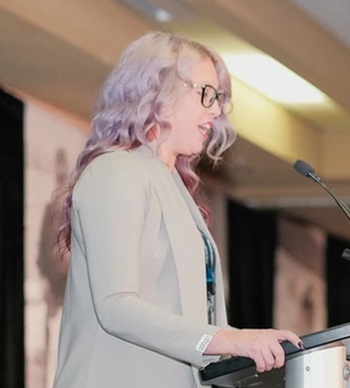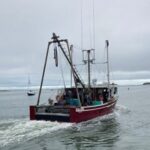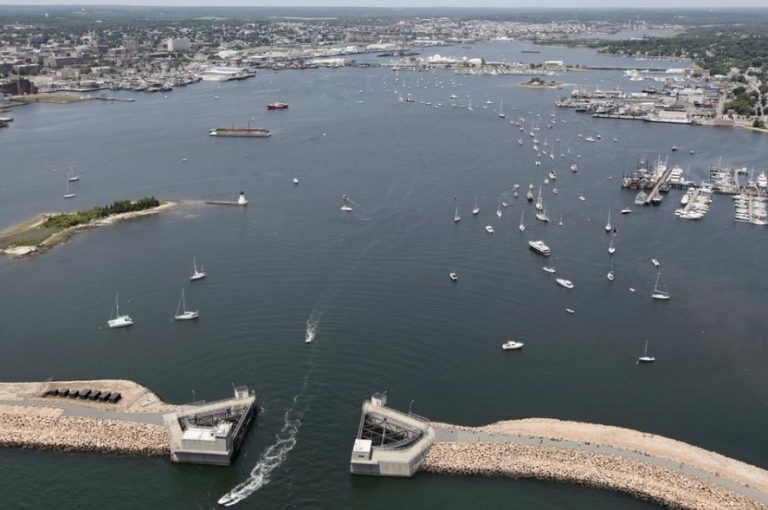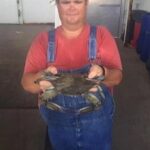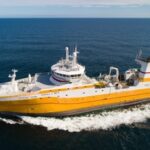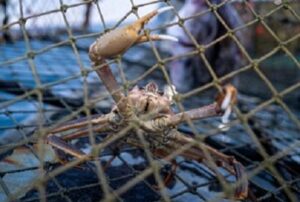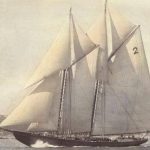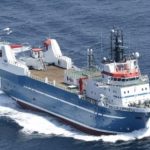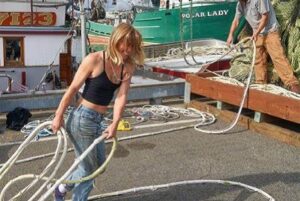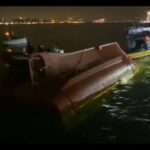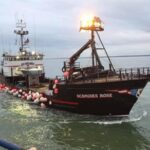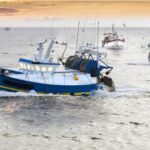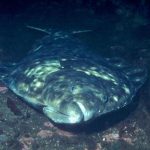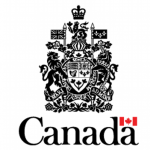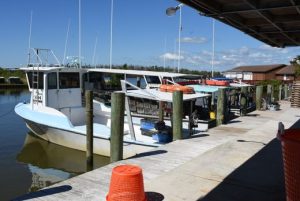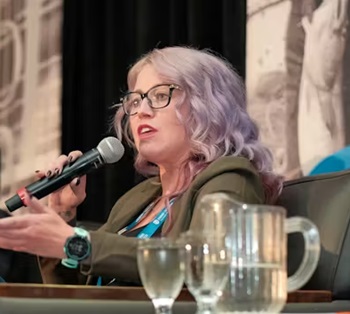 After two seasons of navigating turbulent waters, there is a sense of hope that the Newfoundland and Labrador fishery can finally sail into calmer conditions in April 2024. There was certainly no shortage of conflict on many fronts in 2024, despite efforts to get past some of the tensions that plagued the 2023 season. The provincial government had to step in and help resolve a tie-up by snow crab harvesters in the spring of 2023 that led to a six-week delay to the traditional start of the fishing season. The government formed a committee tasked with finding a better way to settle snow crab pricing, but even its recommendations failed to prevent another disagreement that led to another delayed start in April 2024. more, >>CLICK TO READ<< 09:01
After two seasons of navigating turbulent waters, there is a sense of hope that the Newfoundland and Labrador fishery can finally sail into calmer conditions in April 2024. There was certainly no shortage of conflict on many fronts in 2024, despite efforts to get past some of the tensions that plagued the 2023 season. The provincial government had to step in and help resolve a tie-up by snow crab harvesters in the spring of 2023 that led to a six-week delay to the traditional start of the fishing season. The government formed a committee tasked with finding a better way to settle snow crab pricing, but even its recommendations failed to prevent another disagreement that led to another delayed start in April 2024. more, >>CLICK TO READ<< 09:01
Tag Archives: FFAW-Unifor
ASP says union’s allegations of undercutting NL crab prices unfounded
 While he considers it an anomaly worth inquiring about, Jeff Loder warned against reading too much into the early discrepancy in market prices between snow crab caught in the Gulf of St. Lawrence fishery versus what’s been landed in Newfoundland and Labrador. Loder is executive director of the Association of Seafood Producers (ASP), the entity that represents fish processing companies in Newfoundland and Labrador and was responding to accusations that companies are deliberately undercutting the price they’re asking for snow crab in the early going of the season. That allegation was levelled by FFAW-Unifor, the union that represents fish harvesters and plant workers, in a Wednesday, April 23, news release. Photos, links, more, >>CLICK TO READ<< 10:09
While he considers it an anomaly worth inquiring about, Jeff Loder warned against reading too much into the early discrepancy in market prices between snow crab caught in the Gulf of St. Lawrence fishery versus what’s been landed in Newfoundland and Labrador. Loder is executive director of the Association of Seafood Producers (ASP), the entity that represents fish processing companies in Newfoundland and Labrador and was responding to accusations that companies are deliberately undercutting the price they’re asking for snow crab in the early going of the season. That allegation was levelled by FFAW-Unifor, the union that represents fish harvesters and plant workers, in a Wednesday, April 23, news release. Photos, links, more, >>CLICK TO READ<< 10:09
Something fishy? Harvesters’ union raises concern over discrepancy between prices for NL and Gulf snow crab
 The union representing fish harvesters and plant workers in Newfoundland and Labrador is raising an alarm bell over early reports of the price of snow crab in the marketplace. In a Wednesday, April 23, press release, FFAW-Unifor drew attention to the first Urner Barry quote for the 2025 production of Newfoundland and Labrador snow crab. It has recorded five- to eight-ounce sections at $11.05 per pound — $2.07 below the quote of $13.12 for Gulf crab landed in the Gulf of St. Lawrence fishery. That, according to the union, is a far cry from the usual price spread seen in previous years. Larger-sized crab from Newfoundland and Labrador had yet to be quoted as of Wednesday. more, >>CLICK TO READ<< 09:41
The union representing fish harvesters and plant workers in Newfoundland and Labrador is raising an alarm bell over early reports of the price of snow crab in the marketplace. In a Wednesday, April 23, press release, FFAW-Unifor drew attention to the first Urner Barry quote for the 2025 production of Newfoundland and Labrador snow crab. It has recorded five- to eight-ounce sections at $11.05 per pound — $2.07 below the quote of $13.12 for Gulf crab landed in the Gulf of St. Lawrence fishery. That, according to the union, is a far cry from the usual price spread seen in previous years. Larger-sized crab from Newfoundland and Labrador had yet to be quoted as of Wednesday. more, >>CLICK TO READ<< 09:41
FFAW-Unifor Applauds Provincial Government’s Move to Strengthen Owner-Operator Fishery with New Co-Op Model for Snow Crab Harvesters
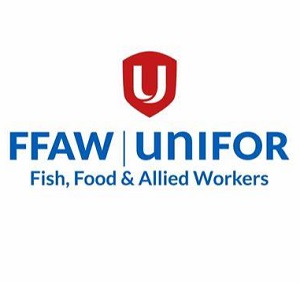 ST. JOHN’S, NL: FFAW-Unifor proudly commends the Honourable Gerry Byrne, Minister of Fisheries, Forestry and Agriculture, for today’s announcement of the Industry Balance and Opportunity Licensing Approach, a transformative initiative that bolsters the owner-operator fishery and fosters a more competitive and balanced snow crab industry in Newfoundland and Labrador. Minister Byrne’s forward-thinking policy, which allows groups of eligible inshore harvesters to access new snow crab primary processing licenses, is a game-changer for our province’s fishery. By empowering harvesters with a combined access of 4.5 million pounds of snow crab to form cooperative, independently owned processing entities, this approach delivers on the Minister’s November 2024 10-point plan to enhance competition, increase processing capacity, and curb corporate concentration. more, >>CLICK TO READ<< 15:08
ST. JOHN’S, NL: FFAW-Unifor proudly commends the Honourable Gerry Byrne, Minister of Fisheries, Forestry and Agriculture, for today’s announcement of the Industry Balance and Opportunity Licensing Approach, a transformative initiative that bolsters the owner-operator fishery and fosters a more competitive and balanced snow crab industry in Newfoundland and Labrador. Minister Byrne’s forward-thinking policy, which allows groups of eligible inshore harvesters to access new snow crab primary processing licenses, is a game-changer for our province’s fishery. By empowering harvesters with a combined access of 4.5 million pounds of snow crab to form cooperative, independently owned processing entities, this approach delivers on the Minister’s November 2024 10-point plan to enhance competition, increase processing capacity, and curb corporate concentration. more, >>CLICK TO READ<< 15:08
Ready to fish: Harvesters, plant workers and processors await panel decision on NL snow crab pricing
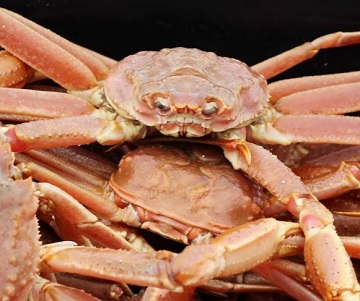 Crab harvesters in most areas of Newfoundland and Labrador were able to start heading to their respective fishing grounds as of Monday, April 7, even though the price they’ll be getting for their catches has yet to be settled. The federal Department of Fisheries and Oceans announced the 2025 snow crab season will open on Thursday, April 10 in parts of fishing zones 3LNO, 3Ps, 3K and 4R3Pn, which collectively take in the waters off the coast of the island of Newfoundland. Harvesters in some areas within those zones could begin heading to the fishing grounds on Monday, though no pots could be set and no crab possessed until 6 a.m. Thursday. more, >>CLICK TO READ<<07:43
Crab harvesters in most areas of Newfoundland and Labrador were able to start heading to their respective fishing grounds as of Monday, April 7, even though the price they’ll be getting for their catches has yet to be settled. The federal Department of Fisheries and Oceans announced the 2025 snow crab season will open on Thursday, April 10 in parts of fishing zones 3LNO, 3Ps, 3K and 4R3Pn, which collectively take in the waters off the coast of the island of Newfoundland. Harvesters in some areas within those zones could begin heading to the fishing grounds on Monday, though no pots could be set and no crab possessed until 6 a.m. Thursday. more, >>CLICK TO READ<<07:43
More fish, for now: Offshore welcomes latest NL northern cod assessment, union questions DFO science
 The latest scientific assessment of northern cod is being touted as good news by companies with stakes in the offshore fishery but is being met with condemnation from the union representing inshore harvesters. The federal Department of Fisheries and Oceans (DFO) announced its findings during a Thursday, April 3, technical briefing. One year ago, DFO’s stock assessment moved northern cod out of what’s known as the critical zone — a level where serious harm is occurring to the stock — to the cautious zone, a designation in which the stock can sustain some fishing pressure. That led to the lifting of the moratorium on commercially fishing for northern cod — the stock of the species found in the waters off Newfoundland’s eastern coast and as far north as the southern shores of Labrador. Photos, more, >>CLICK TO READ<< 12:49
The latest scientific assessment of northern cod is being touted as good news by companies with stakes in the offshore fishery but is being met with condemnation from the union representing inshore harvesters. The federal Department of Fisheries and Oceans (DFO) announced its findings during a Thursday, April 3, technical briefing. One year ago, DFO’s stock assessment moved northern cod out of what’s known as the critical zone — a level where serious harm is occurring to the stock — to the cautious zone, a designation in which the stock can sustain some fishing pressure. That led to the lifting of the moratorium on commercially fishing for northern cod — the stock of the species found in the waters off Newfoundland’s eastern coast and as far north as the southern shores of Labrador. Photos, more, >>CLICK TO READ<< 12:49
To be determined: Tariffs threat gone, but NL crab price still a contentious issue
 The immediate threat of tariffs has dissipated, but there is no word that the fish processors and harvesters might head back to the negotiating table to hammer out a new price for crab to get the season going. The sides have been caught up in a legal drama since Fisheries, Forestry and Agriculture Minister Gerry Byrne approved a delay in the date the parties involved were to have a pricing arrangement in place. The Association of Seafood Producers (ASP), which represents most of the processing companies in Newfoundland and Labrador, took exception to the minister’s decision because it was not a joint request to change the date. Byrne changed the date from April 1 to April 13 due to the extenuating and unforeseen circumstances when FFAW-Unifor, the union that represents most fish harvesters and plant workers, had to change its lead negotiator. more, >>CLICK TO READ<< 08:58
The immediate threat of tariffs has dissipated, but there is no word that the fish processors and harvesters might head back to the negotiating table to hammer out a new price for crab to get the season going. The sides have been caught up in a legal drama since Fisheries, Forestry and Agriculture Minister Gerry Byrne approved a delay in the date the parties involved were to have a pricing arrangement in place. The Association of Seafood Producers (ASP), which represents most of the processing companies in Newfoundland and Labrador, took exception to the minister’s decision because it was not a joint request to change the date. Byrne changed the date from April 1 to April 13 due to the extenuating and unforeseen circumstances when FFAW-Unifor, the union that represents most fish harvesters and plant workers, had to change its lead negotiator. more, >>CLICK TO READ<< 08:58

Back to the pricing board: Panel to hear submissions on NL snow crab pricing while union requests slight delay to season starting
After a busy week away from the negotiating table, the focus of the Newfoundland and Labrador snow crab season will shift to a hearing before the province’s Standing Fish Price Setting Panel on Saturday, March 29. Despite hopes to avoid having to resort to the panel to determine the minimum price for crab again this season, the union representing the province’s inshore fish harvesters and plant workers and the organization representing fish processing companies were unable to reach enough common ground for a new collective agreement. That means both sides will present their respective submissions to the panel, which will decide who has the most reasonable offer for pricing crab landings this coming season. more, >>CLICK TO READ<< 15:41
Big day for little shrimp: NL fish union hopes positive update on northern shrimp stock status translates into good news for fishery
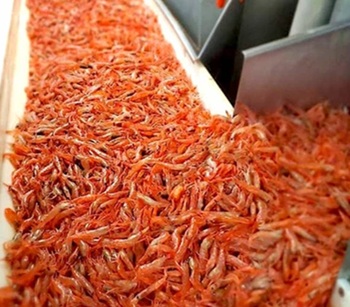 The latest stock assessment for northern shrimp, which used a revised approach to project the health of the species off the Newfoundland and Labrador coast, is being welcomed by the union that represents the provinces inshore harvesters and plant workers. In a technical briefing on Wednesday, March 19, the federal Department of Fisheries and Oceans (DFO) officially projected northern shrimp will be in the healthy zone, in accordance to the department’s precautionary approach to species management. For the latest assessment, DFO combined six fishing areas all along the eastern coasts of Newfoundland and Labrador, collapsing them into two stock assessment regions divided by the boundary between Northwest Atlantic Fisheries Organization (NAFO) Divisions 2H and 2J. more, >>CLICK TO READ<< 06:12
The latest stock assessment for northern shrimp, which used a revised approach to project the health of the species off the Newfoundland and Labrador coast, is being welcomed by the union that represents the provinces inshore harvesters and plant workers. In a technical briefing on Wednesday, March 19, the federal Department of Fisheries and Oceans (DFO) officially projected northern shrimp will be in the healthy zone, in accordance to the department’s precautionary approach to species management. For the latest assessment, DFO combined six fishing areas all along the eastern coasts of Newfoundland and Labrador, collapsing them into two stock assessment regions divided by the boundary between Northwest Atlantic Fisheries Organization (NAFO) Divisions 2H and 2J. more, >>CLICK TO READ<< 06:12
Harvesters Applaud Long-Overdue Changes to Northern Shrimp Assessment; New Model Moves Species into Healthy Zone
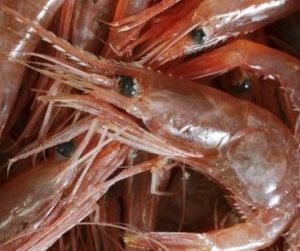 FFAW-Unifor welcomes the updated Northern Shrimp assessment model, which officially shifts the species into the healthy zone under revised stock areas, assessment model and reference points. FFAW scientist Dr. Erin Carruthers participated in the assessment process, along with shrimp harvesters Chris Rose and Heather Starkes, who praised the innovative and collaborative approach to align the assessment process with ecosystem realities. “This is a long overdue recognition of the ecological realities in Newfoundland and Labrador marine ecosystems. We appreciate the considerable efforts to solve this long-standing issue and the commitment of shrimp harvesters and Dr. Erin Carruthers, to see this effort through to the end,” says FFAW-Unifor President Dwan Street, adding that, “the next step, of course, is to ensure inshore fleets’ access and allocations reflect the change in stock status.” more, >>CLICK TO READ<< 09:29
FFAW-Unifor welcomes the updated Northern Shrimp assessment model, which officially shifts the species into the healthy zone under revised stock areas, assessment model and reference points. FFAW scientist Dr. Erin Carruthers participated in the assessment process, along with shrimp harvesters Chris Rose and Heather Starkes, who praised the innovative and collaborative approach to align the assessment process with ecosystem realities. “This is a long overdue recognition of the ecological realities in Newfoundland and Labrador marine ecosystems. We appreciate the considerable efforts to solve this long-standing issue and the commitment of shrimp harvesters and Dr. Erin Carruthers, to see this effort through to the end,” says FFAW-Unifor President Dwan Street, adding that, “the next step, of course, is to ensure inshore fleets’ access and allocations reflect the change in stock status.” more, >>CLICK TO READ<< 09:29
Hitting pause: Talks to set price for 2025 snow crab season in NL on hold
 There’s still no deal, but both sides trying to hammer out a new pricing formula for Newfoundland and Labrador’s snow crab fishery have agreed to pause talks until March 19. That will be one day after Seafood Expo North America, the major annual seafood show in Boston, where this year’s provincial delegation will be looking to convince American buyers that tariffs placed on Canadian exports, including seafood, are not a good thing for the sector. The negotiators from both FFAW-Unifor, the union that represents fish harvesters and plant workers, and the Association of Seafood Producers (ASP), which represents fish processing companies, have met several times since the middle of January to try to hammer out a snow crab price for the 2025 season. more, >>CLICK TO READ<< 06:38
There’s still no deal, but both sides trying to hammer out a new pricing formula for Newfoundland and Labrador’s snow crab fishery have agreed to pause talks until March 19. That will be one day after Seafood Expo North America, the major annual seafood show in Boston, where this year’s provincial delegation will be looking to convince American buyers that tariffs placed on Canadian exports, including seafood, are not a good thing for the sector. The negotiators from both FFAW-Unifor, the union that represents fish harvesters and plant workers, and the Association of Seafood Producers (ASP), which represents fish processing companies, have met several times since the middle of January to try to hammer out a snow crab price for the 2025 season. more, >>CLICK TO READ<< 06:38
Berth control: NL fish harvesters hope there’s room for everyone at Little Port amid cargo ship salvage
 Some fish harvesters in the outer Bay of Islands are wondering how their livelihoods might be affected by the ongoing situation with the grounded cargo ship in Cedar Cove. The MSC Baltic III lost power and ran ashore in the cove, also known as Wild Cove, in the early morning hours of Feb. 15, 2025. For fish harvesters, Little Port is a crucial area. It’s where they base their fishing enterprises, including landing their catches and tying up when not at sea pursuing their respective quotas. John Gilbert of Humber Arm South is the skipper of a crew of five that catches crab, lobster and halibut. He is also a fleet representative for FFAW-Unifor, the union representing inshore fish harvesters and plant workers. He said harvesters have no real contingency plan if they can’t use Little Port. Photos, more, >>CLICK TO READ<< 09:10
Some fish harvesters in the outer Bay of Islands are wondering how their livelihoods might be affected by the ongoing situation with the grounded cargo ship in Cedar Cove. The MSC Baltic III lost power and ran ashore in the cove, also known as Wild Cove, in the early morning hours of Feb. 15, 2025. For fish harvesters, Little Port is a crucial area. It’s where they base their fishing enterprises, including landing their catches and tying up when not at sea pursuing their respective quotas. John Gilbert of Humber Arm South is the skipper of a crew of five that catches crab, lobster and halibut. He is also a fleet representative for FFAW-Unifor, the union representing inshore fish harvesters and plant workers. He said harvesters have no real contingency plan if they can’t use Little Port. Photos, more, >>CLICK TO READ<< 09:10
RESULTS OF LATEST SNOW CRAB ASSESSMENT
 Today, the Department of Fisheries and Oceans (DFO) released the latest stock assessment update for Newfoundland and Labrador’s snow crab fishery, reporting differences in stock health among regions. Attending on behalf of FFAW- Unifor were Fisheries Scientist, Dr. Erin Carruthers, with harvesters Nelson Bussey and Chad Waterman (3LNO), Scott Spurvey (3Ps), Eldred Woodford (3K), as well as Alton Rumbolt who participated online (2J).Nelson Bussey highlighted the good news for 3LNO noting that, “Biomass levels are at the highest levels seen in decades, likely, in part, because we have maintained reasonable exploitation levels. There appears to be scope for growth, which is welcome news for the fleets in our areas.” more, >>CLICK To READ<< 10:01
Today, the Department of Fisheries and Oceans (DFO) released the latest stock assessment update for Newfoundland and Labrador’s snow crab fishery, reporting differences in stock health among regions. Attending on behalf of FFAW- Unifor were Fisheries Scientist, Dr. Erin Carruthers, with harvesters Nelson Bussey and Chad Waterman (3LNO), Scott Spurvey (3Ps), Eldred Woodford (3K), as well as Alton Rumbolt who participated online (2J).Nelson Bussey highlighted the good news for 3LNO noting that, “Biomass levels are at the highest levels seen in decades, likely, in part, because we have maintained reasonable exploitation levels. There appears to be scope for growth, which is welcome news for the fleets in our areas.” more, >>CLICK To READ<< 10:01
FAW-UNIFOR CALLS FOR MP INTERVENTION TO HALT DFO’s INFLEXIBLE E-LOG IMPLEMENTATION
 FFAW-Unifor is urging Members of Parliament to intervene following the Department of Fisheries and Oceans’ (DFO) rejection of their proposed electronic logbook (ELOG) implementation plan. The union’s proposal aimed to address critical concerns raised by harvesters and facilitate a smoother transition to ELOGs. FFAW-Unifor President Dwan Street expressed strong disapproval of DFO’s decision, stating, “DFO’s inflexibility in mandating ELOGs without addressing accessibility issues, technology concerns, and cost implications places an undue burden on our harvesters. We call on our MPs to step in and halt this misguided implementation that threatens the livelihoods of our fishing communities”. more, >>CLICK TO READ<< 14:37
FFAW-Unifor is urging Members of Parliament to intervene following the Department of Fisheries and Oceans’ (DFO) rejection of their proposed electronic logbook (ELOG) implementation plan. The union’s proposal aimed to address critical concerns raised by harvesters and facilitate a smoother transition to ELOGs. FFAW-Unifor President Dwan Street expressed strong disapproval of DFO’s decision, stating, “DFO’s inflexibility in mandating ELOGs without addressing accessibility issues, technology concerns, and cost implications places an undue burden on our harvesters. We call on our MPs to step in and halt this misguided implementation that threatens the livelihoods of our fishing communities”. more, >>CLICK TO READ<< 14:37
Seafood sector is united in face of tariff threats, says N.L.’s fisheries minister
 A unified effort to navigate the Newfoundland and Labrador seafood industry through the uncertainty of U.S. tariff threats began on Wednesday, with more than two dozen people joining by video conference in the first fishery roundtable meeting. The meeting was chaired by Fisheries Minister Gerry Byrne, who described the discussions as “one of the best meetings I’ve ever hosted.” The meeting was spawned from a broader premier’s roundtable that was assembled last month in response to a threat from U.S. President Donald Trump to place a 25 per cent tariff on Canadian goods entering the U.S. market, including seafood. Joining the meeting were leaders in all sectors of the fishery, including union leaders, processors, harvesters, marketing specialists and the aquaculture industry. more, >>CLICK TO READ<< 18:42
A unified effort to navigate the Newfoundland and Labrador seafood industry through the uncertainty of U.S. tariff threats began on Wednesday, with more than two dozen people joining by video conference in the first fishery roundtable meeting. The meeting was chaired by Fisheries Minister Gerry Byrne, who described the discussions as “one of the best meetings I’ve ever hosted.” The meeting was spawned from a broader premier’s roundtable that was assembled last month in response to a threat from U.S. President Donald Trump to place a 25 per cent tariff on Canadian goods entering the U.S. market, including seafood. Joining the meeting were leaders in all sectors of the fishery, including union leaders, processors, harvesters, marketing specialists and the aquaculture industry. more, >>CLICK TO READ<< 18:42
Fishery in jeopardy: Trump tariff threat putting NL fishing season at risk
 The threat of looming American tariffs on Canadian exports doesn’t just have the Newfoundland and Labrador fishing industry concerned about bottom lines. There’s a worry if there can be a fishery at all. Often sides that are at odds with one another on many matters, both the association representing the province’s seafood processing companies and the union representing the province’s fish harvesters and plant workers held a joint news conference in St. John’s on Monday, Feb. 3, to discuss the situation the fishery finds itself with 25 per cent tariffs expected to be imposed on Canadian exports into the United States. A last-minute negotiation between Prime Minister Justin Trudeau and US President Donald Trump on Feb. 3 delayed the tariff threat for 30 days. more, >>CLICK TO READ<< 16:03
The threat of looming American tariffs on Canadian exports doesn’t just have the Newfoundland and Labrador fishing industry concerned about bottom lines. There’s a worry if there can be a fishery at all. Often sides that are at odds with one another on many matters, both the association representing the province’s seafood processing companies and the union representing the province’s fish harvesters and plant workers held a joint news conference in St. John’s on Monday, Feb. 3, to discuss the situation the fishery finds itself with 25 per cent tariffs expected to be imposed on Canadian exports into the United States. A last-minute negotiation between Prime Minister Justin Trudeau and US President Donald Trump on Feb. 3 delayed the tariff threat for 30 days. more, >>CLICK TO READ<< 16:03
NEW EXECUTIVE BOARD SWEARING IN TUES NOV 19
 Please be advised that FFAW-Unifor is hosting its triennial Constitutional Convention next week at Quality Hotel and Suites in Gander. 160 delegates are registered to attend, representing all sectors of the Union. Monday, November 18 at 1:15PM: INSHORE PANEL Safety At Sea: Bringing Harvesters Home Safely with Craig Parsons (NL-FHSA), Terry Billard (Cheryl &Diane), Eugene Carter (Elite Navigator ‘Lucky 7’), Mark Gould (Coast Guard SAR) and MOD Sherry Glynn (FFAW) (SALON A/B). Tuesday, November 19 at 4:15PM: Swearing in of the New Executive Board and New President Speech more, >>CLICK TO READ<< 12:25
Please be advised that FFAW-Unifor is hosting its triennial Constitutional Convention next week at Quality Hotel and Suites in Gander. 160 delegates are registered to attend, representing all sectors of the Union. Monday, November 18 at 1:15PM: INSHORE PANEL Safety At Sea: Bringing Harvesters Home Safely with Craig Parsons (NL-FHSA), Terry Billard (Cheryl &Diane), Eugene Carter (Elite Navigator ‘Lucky 7’), Mark Gould (Coast Guard SAR) and MOD Sherry Glynn (FFAW) (SALON A/B). Tuesday, November 19 at 4:15PM: Swearing in of the New Executive Board and New President Speech more, >>CLICK TO READ<< 12:25
Federal Fisheries Minister Chose to Re-Open Northern Cod Commercial Fishery Against Recommendation for Stewardship Fishery
 The Union representing fish harvesters in Newfoundland and Labrador have received more documents submitted by the Government of Canada in connection with the federal injunction filed by FFAW-Unifor in July, proving Minister Lebouthillier’s blatant negligence in ending the moratorium on Northern cod. These recent documents show that, despite insistence from NL Liberal MPs and DFO officials, Minister Diane Lebouthillier was presented with three options to decide a management approach for Northern cod in the 2024 season. In a document issued by the office of Deputy Minister Annette Gibbons on May 6, 2024, the recommended option from DFO bureaucrats and scientists was to maintain a stewardship fishery and maximum allowable harvest (MAH) level of 13,000t, reflecting a more cautious approach that would potentially result in less dramatic stock declines in the future and could help to avoid challenges in the management of the stock in the longer term. more, >>CLICK TO READ<< 08:57
The Union representing fish harvesters in Newfoundland and Labrador have received more documents submitted by the Government of Canada in connection with the federal injunction filed by FFAW-Unifor in July, proving Minister Lebouthillier’s blatant negligence in ending the moratorium on Northern cod. These recent documents show that, despite insistence from NL Liberal MPs and DFO officials, Minister Diane Lebouthillier was presented with three options to decide a management approach for Northern cod in the 2024 season. In a document issued by the office of Deputy Minister Annette Gibbons on May 6, 2024, the recommended option from DFO bureaucrats and scientists was to maintain a stewardship fishery and maximum allowable harvest (MAH) level of 13,000t, reflecting a more cautious approach that would potentially result in less dramatic stock declines in the future and could help to avoid challenges in the management of the stock in the longer term. more, >>CLICK TO READ<< 08:57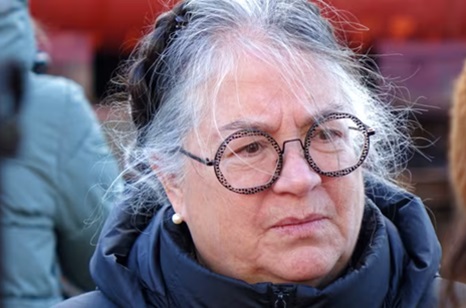
Federal Fisheries minister ignored DFO advice by reopening commercial cod fishery
Federal Fisheries Minister Diane Lebouthillier ignored the advice of staff within her department when she reopened the commercial cod fishery off Newfoundland and Labrador last June. A briefing note dated May 9 reveals that Fisheries and Oceans Canada recommended maintaining the long-time moratorium on northern cod based on scientific evidence, but that political advisors within the minister’s office argued reopening the commercial fishery and hiking quotas would be “politically a victory.” Senior policy advisor Paul Carrigan wrote that DFO staff were concerned about an increase to quotas and the return of offshore boats in the fishery, which would “increase the stocks’ risk of decline.” more, >>CLICK TO READ<< 06:47
FFAW Rotted with NL Liberal MPs’ Support for Return of Draggers
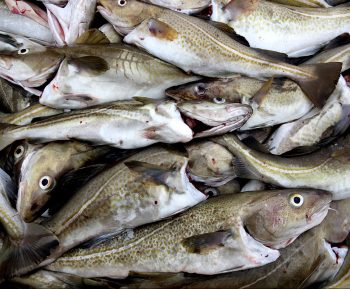 The FFAW says documents filed by Ottawa to defend reopening of a commercial cod fishery show all Liberal MPs supported the feds’ decision. The reopening once again gives local processors and NAFO countries access to the resource with offshore draggers, while the stock remains in the cautious zone. Pretty notes there was a promise for the first 115,000 metric tonnes of the 2J3KL northern cod quota to be allocated to inshore harvesters and Indigenous groups. He calls the actions of the six Liberal MPs — Gudie Hutchings, Seamus O’Regan, Joanne Thompson, Churence Rogers, Yvonne Jones, and Ken McDonald — “a total betrayal.” more, >>CLICK TO READ<< 07:01
The FFAW says documents filed by Ottawa to defend reopening of a commercial cod fishery show all Liberal MPs supported the feds’ decision. The reopening once again gives local processors and NAFO countries access to the resource with offshore draggers, while the stock remains in the cautious zone. Pretty notes there was a promise for the first 115,000 metric tonnes of the 2J3KL northern cod quota to be allocated to inshore harvesters and Indigenous groups. He calls the actions of the six Liberal MPs — Gudie Hutchings, Seamus O’Regan, Joanne Thompson, Churence Rogers, Yvonne Jones, and Ken McDonald — “a total betrayal.” more, >>CLICK TO READ<< 07:01
All NL MPs Supported Breaking Historical Agreement for Northern Cod, Injunction Documents Show
 Documents submitted by the Government of Canada as part of the federal injunction filed by FFAW-Unifor in July show that all Liberal MPs in the province supported breaking the longstanding agreement on Northern cod to allow offshore draggers access while the stock remains in the cautious zone. “Documents are quickly coming in from DFO staffers via the federal court process. What we’ve seen thus far is a Liberal caucus of NL politicians who supported breaking the 40-plus year agreement to our province – and while it’s certainly not shocking at this point, it should be a real eye opener to the people of our province who elected these individuals to office,” says FFAW-Unifor Greg Pretty. more, >>CLICK TO READ<< 09:30
Documents submitted by the Government of Canada as part of the federal injunction filed by FFAW-Unifor in July show that all Liberal MPs in the province supported breaking the longstanding agreement on Northern cod to allow offshore draggers access while the stock remains in the cautious zone. “Documents are quickly coming in from DFO staffers via the federal court process. What we’ve seen thus far is a Liberal caucus of NL politicians who supported breaking the 40-plus year agreement to our province – and while it’s certainly not shocking at this point, it should be a real eye opener to the people of our province who elected these individuals to office,” says FFAW-Unifor Greg Pretty. more, >>CLICK TO READ<< 09:30
Harvesters Won’t Fish for Panel Price, Colossal Failure of Price Setting Panel Continues
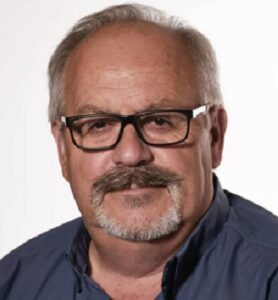 The offer from the Association of Seafood Producers (ASP) fails to provide a fair distribution of value and highlights the total failure of the price setting system in the province, and harvesters are refusing to fish. “The ask here is straightforward—capelin harvesters are seeking a fair share of the value derived from the capelin fishery. We are proposing a formula-based system that would account for market uncertainties and ensure that the value is evenly split between processors and harvesters. We need to guarantee that at least half the value of the fishery remains with the workers in Newfoundland and Labrador,” explains FFAW-Unifor President Greg Pretty. “If ASP members are serious about this being a shared industry under threat, then give us our fair share,” says Trevor Jones, fish harvester and Negotiating Committee member. “If the Province is serious about preserving the inshore fishery and keeping the value of the fishery in the hands of workers in this province, then they have to take a stronger stance. A minimum price must be a fair price,” says Jones. more, >>CLICK TO READ<< 11:12
The offer from the Association of Seafood Producers (ASP) fails to provide a fair distribution of value and highlights the total failure of the price setting system in the province, and harvesters are refusing to fish. “The ask here is straightforward—capelin harvesters are seeking a fair share of the value derived from the capelin fishery. We are proposing a formula-based system that would account for market uncertainties and ensure that the value is evenly split between processors and harvesters. We need to guarantee that at least half the value of the fishery remains with the workers in Newfoundland and Labrador,” explains FFAW-Unifor President Greg Pretty. “If ASP members are serious about this being a shared industry under threat, then give us our fair share,” says Trevor Jones, fish harvester and Negotiating Committee member. “If the Province is serious about preserving the inshore fishery and keeping the value of the fishery in the hands of workers in this province, then they have to take a stronger stance. A minimum price must be a fair price,” says Jones. more, >>CLICK TO READ<< 11:12
Newfoundland and Labrador: Crab Harvesters Demand Fair Share
 The crab fishing season officially started on Saturday, April 6th, yet all harvesters in Newfoundland and Labrador stayed tied up demanding their fair share. The Blackwood Report, commissioned by the province, demonstrated a fair-sharing arrangement for fish harvesters in Newfoundland and Labrador. Harvesters refuse to fish for any formula that undersells their slice of the pie. What are harvesters demanding: more, >>click to read<< 09:24
The crab fishing season officially started on Saturday, April 6th, yet all harvesters in Newfoundland and Labrador stayed tied up demanding their fair share. The Blackwood Report, commissioned by the province, demonstrated a fair-sharing arrangement for fish harvesters in Newfoundland and Labrador. Harvesters refuse to fish for any formula that undersells their slice of the pie. What are harvesters demanding: more, >>click to read<< 09:24
Panel Selects ASP Formula, Pulling Fair Market Share from Harvester Reach
 Minutes ago, the Standing Fish Price Setting Panel announced their decision for the 2024 snow crab season, siding with the Association of Seafood Producers formula. FFAW’s offer was based on the Blackwood report and would have seen harvesters capture a fair market value based on historic shares. ASP’s formula is not based on historic data, nor was justification found within their submission document. Moreover, there is no mechanism for harvesters to benefit as the market increases. ASP caps harvester share at 37% once the market reaches $8.02CAD, contrary to historic pricing shares that increases the harvester share as market prices increase. more, including 2024 Crab Fishery Decision, >>click to read<< 19:50
Minutes ago, the Standing Fish Price Setting Panel announced their decision for the 2024 snow crab season, siding with the Association of Seafood Producers formula. FFAW’s offer was based on the Blackwood report and would have seen harvesters capture a fair market value based on historic shares. ASP’s formula is not based on historic data, nor was justification found within their submission document. Moreover, there is no mechanism for harvesters to benefit as the market increases. ASP caps harvester share at 37% once the market reaches $8.02CAD, contrary to historic pricing shares that increases the harvester share as market prices increase. more, including 2024 Crab Fishery Decision, >>click to read<< 19:50
FFAW Calls for Drastic Changes to Provincial Processing Licensing Amid Harvester Protests in St. John’s
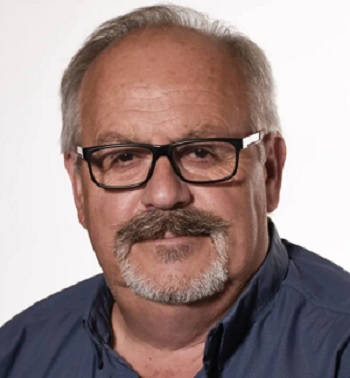 ST. JOHN’S, NL – FFAW-Unifor is calling on the provincial government to listen to protesting fish harvesters by lifting all processing caps in the province, grant new processing licenses, and remove restrictions on outside buyers. “Fish harvesters in our province have been disadvantaged long enough. The situation has gotten so severe in recent years that a very large number are now facing imminent bankruptcy due to the cartel-like environment processing companies enjoy here in Newfoundland and Labrador,” explains Greg Pretty, FFAW-Unifor. “When fish harvesters cannot find a buyer for their catch – we have a serious problem. This province cannot have a thriving fishery if fish harvesters are not succeeding, and the current wall of opposition they face makes success unattainable,” Pretty says. more, >>click to read<< 15:01
ST. JOHN’S, NL – FFAW-Unifor is calling on the provincial government to listen to protesting fish harvesters by lifting all processing caps in the province, grant new processing licenses, and remove restrictions on outside buyers. “Fish harvesters in our province have been disadvantaged long enough. The situation has gotten so severe in recent years that a very large number are now facing imminent bankruptcy due to the cartel-like environment processing companies enjoy here in Newfoundland and Labrador,” explains Greg Pretty, FFAW-Unifor. “When fish harvesters cannot find a buyer for their catch – we have a serious problem. This province cannot have a thriving fishery if fish harvesters are not succeeding, and the current wall of opposition they face makes success unattainable,” Pretty says. more, >>click to read<< 15:01
Response to ASP Grievance on Crab Tie-Up – What the Decision Means and Next Steps
 Statement from Greg Pretty, FFAW-Unifor President – February 21, 2024 – The 2023 crab tie-up was an extremely difficult time for the entire province and our members in both fishing and processing. Unfortunately, fish harvesters felt they had to act but outdated legislation makes it illegal for harvesters to strike, as well as illegal for the Union to ‘authorize or declare a cessation of business dealings’ It is this specific language where the arbitrator found FFAW-Unifor liable. Instead of helping to resolve the catastrophically low-price in spring of 2023, ASP sat back and watched the fishery fall – only later deciding to take legal action 6 months after the issue was resolved and fishery complete. more, >>click to read<< 08:14
Statement from Greg Pretty, FFAW-Unifor President – February 21, 2024 – The 2023 crab tie-up was an extremely difficult time for the entire province and our members in both fishing and processing. Unfortunately, fish harvesters felt they had to act but outdated legislation makes it illegal for harvesters to strike, as well as illegal for the Union to ‘authorize or declare a cessation of business dealings’ It is this specific language where the arbitrator found FFAW-Unifor liable. Instead of helping to resolve the catastrophically low-price in spring of 2023, ASP sat back and watched the fishery fall – only later deciding to take legal action 6 months after the issue was resolved and fishery complete. more, >>click to read<< 08:14
Commercial redfish fishery to reopen, but pending quota threatens to push some fishers out
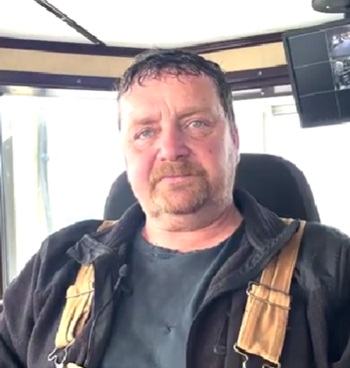 “It hurts me to talk about it,” says Brad Genge, a 51-year-old inshore fisherman from Anchor Point, on the west coast of Newfoundland’s northern peninsula. Genge says what should have been a good news story – the Government of Canada’s historic reopening of the east coast commercial redfish fishery – is hitting fishermen in this province hard. “Worst news we could have gotten,” says Genge. “Only thing that could have hurt more is if they came down and hit us in the face with a piece of lumber.” “We are done, we are out of the fishery,” says Genge, who tied up his trawler, the BNB Mariner, in early February. Video, more, >>click to read<< 08:22
“It hurts me to talk about it,” says Brad Genge, a 51-year-old inshore fisherman from Anchor Point, on the west coast of Newfoundland’s northern peninsula. Genge says what should have been a good news story – the Government of Canada’s historic reopening of the east coast commercial redfish fishery – is hitting fishermen in this province hard. “Worst news we could have gotten,” says Genge. “Only thing that could have hurt more is if they came down and hit us in the face with a piece of lumber.” “We are done, we are out of the fishery,” says Genge, who tied up his trawler, the BNB Mariner, in early February. Video, more, >>click to read<< 08:22






 It may not have any effect whatsoever on the start of the snow crab fishery, but the courts have decided Fisheries Minister Gerry Byrne overstepped his authority by changing the deadline by which a price must be set. The issue landed before Justice Alexander MacDonald of the Supreme Court of Newfoundland and Labrador when Byrne decided to change the date from April 1 to April 13. The date is crucial because the snow crab fishing season cannot open until the price and sale terms are set, provided the opening date has also been set by the federal Department of Fisheries and Oceans. Negotiations between FFAW-Unifor, the union that represents inshore fish harvesters and plant workers in Newfoundland and Labrador, and the Association of Seafood Producers (ASP), which represents fish processing companies in the province, failed to reach an agreement on price.
It may not have any effect whatsoever on the start of the snow crab fishery, but the courts have decided Fisheries Minister Gerry Byrne overstepped his authority by changing the deadline by which a price must be set. The issue landed before Justice Alexander MacDonald of the Supreme Court of Newfoundland and Labrador when Byrne decided to change the date from April 1 to April 13. The date is crucial because the snow crab fishing season cannot open until the price and sale terms are set, provided the opening date has also been set by the federal Department of Fisheries and Oceans. Negotiations between FFAW-Unifor, the union that represents inshore fish harvesters and plant workers in Newfoundland and Labrador, and the Association of Seafood Producers (ASP), which represents fish processing companies in the province, failed to reach an agreement on price. 